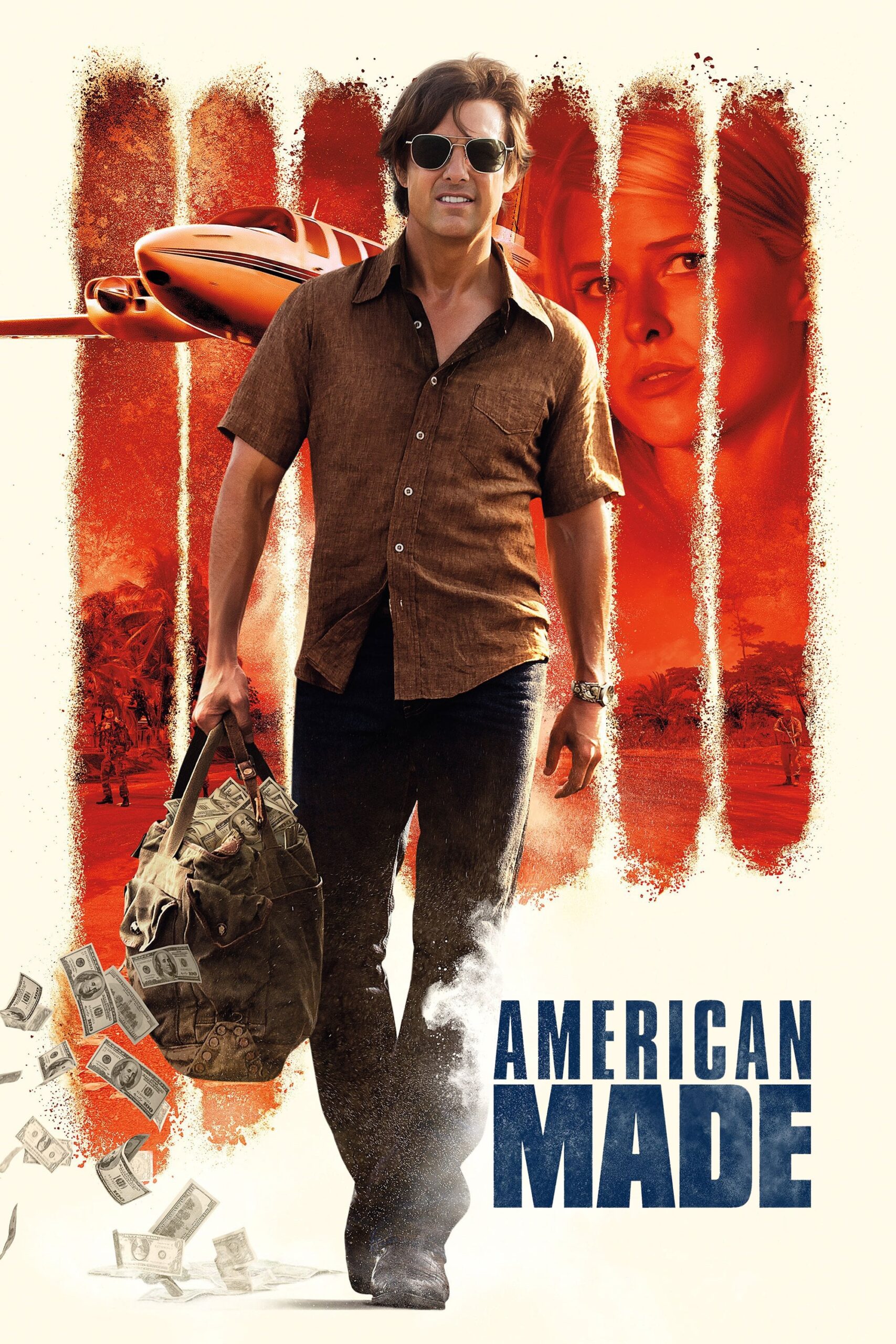Spoilers:
- Barry is killed by cartel.
- Barry secretly works for CIA.
- Money laundering gets too big.
- Barry becomes a DEA informant.
- Family flees but can’t escape.
- Pilot job becomes dangerous operation.
- Government eventually abandons Barry.
- Barry’s double life spirals out.
American Made: Statistics
The movie “American Made” is a biographical crime film released in 2017. Here’s a straightforward breakdown of its key statistics:
| Attribute | Details |
|---|---|
| Director | Doug Liman |
| Lead Actor | Tom Cruise |
| Release Date | September 29, 2017 |
| Genre | Crime, Drama |
| Running Time | 115 minutes |
| Production Budget | $50 million |
| Box Office | $134.9 million |
| Rotten Tomatoes Score | 86% |
| Metacritic Score | 65/100 |
| IMDB Rating | 7.2/10 |
The film portrays the story of Barry Seal, a pilot who becomes a drug runner for the CIA in the 1980s. It is known for its engaging plot and Cruise’s dynamic performance, although it doesn’t dive deep into ethical considerations.
Overall, “American Made” is a captivating mix of crime and adventure with a touch of dark humor.
Introduction to “American Made”
“American Made” is a 2017 film that spirals around the real-life story of Barry Seal, a commercial pilot turned drug smuggler, and informant for the CIA in the 1980s. Directed by Doug Liman, the film stars Tom Cruise in the lead role, exuding charisma and a cavalier attitude.
Interesting Facts
- Barry Seal’s life was far from ordinary. He transitioned from being a TWA pilot to working with the Medellín Cartel and the CIA.
- Although based on real events, the film has a fast-paced narrative and creative liberties are taken, particularly in depicting Seal’s engagements with the CIA.
- The title “American Made” reflects the ethos of exploiting opportunities in the black market of drug trade and covert operations.
Speculation and Bizarre Elements
- There’s been speculation about the degree of Seal’s involvement with the U.S. government. The movie dramatizes these elements for cinematic effect.
- The portrayal of Seal’s collaboration with notorious drug lords, such as Pablo Escobar, creates an air of skepticism regarding the true extent of his interactions.
- Tom Cruise reportedly did many of his own flying stunts, adding to the movie’s adrenaline rush.
Public Perception Over Time
The public’s perception of “American Made” has evolved since its release. Initially, audiences were captivated by the mix of action, humor, and historical context. The film was praised for its brisk narrative and Tom Cruise’s energetic performance. However, some critiques point to the glossing over of complexities in drug-trafficking issues. Over the years, the film has been appreciated more for its entertainment value rather than its historical accuracy.
American Made: Fast-Paced Beats Breakdown
Opening Act: Set in the late 70s, meet Barry Seal – a TWA pilot bored out of his mind. Introduction is quick, setting the tone for a wild story.
Beat 1: The CIA Knock
Barry’s mundane life takes a sharp turn. Monty ‘Schafer’ from CIA drops a life-changing offer. Barry’s in for covert ops, snapping pics over Central America. No second thought given.
Beat 2: Smuggling 101
Plot twist: Barry’s now smuggling for the Medellín Cartel along with his CIA gigs. Double life begins. Escalation is rapid, stakes high, and Barry’s loving it.
Beat 3: Money Flood
Enter the era of excess. Barry’s raking in cash – it’s raining money, literally. But with great cash comes great problems. Storage creativity is key.
Beat 4: The Family Dilemma
Family’s dragged into chaos. Relocation and revelations. Barry’s wife, Lucy, and kids are in for a rollercoaster, adapting to the new ‘normal.’
Beat 5: Expansion & Complications
Barry’s empire expands. Arms smuggling enters the chat. The operations are bigger, but so are the risks. Every move is a gamble.
Beat 6: Law on the Horizon
Heat’s turning up. Between the DEA, ATF, and countless other acronyms, Barry’s juggling more than he can handle. Walls are closing in.
Beat 7: The Crash
Not just metaphorical. Barry’s maneuvers catch up with him. Legal and moral crash landing. It’s the beginning of the end.
Beat 8: Desperation Moves
Facing the music – Barry’s scrambling. Attempts to navigate the legal and illegal battles. Deals are made, but at what cost?
Beat 9: The Downfall
Inevitable collapse. Betrayals, arrests, and the crumbling of an empire. Barry’s ride comes to a halt in a dizzying conclusion.
Final Beat: Reflective End
Barry’s looking back. A moment of contemplation amidst chaos. The American Dream or nightmare? Ends on a reflective, ambiguous note.

American Made: A Direct Exploration
Story Opening Analysis
The opening of “American Made” immediately throws the audience into the chaotic world of Tom Cruise’s character, Barry Seal. The film begins with a voiceover, which instantly helps establish the tone. There’s a gripping sense of urgency as Barry narrates his life story. The visuals quickly shift from intimate moments of his family life to his high-flying adventures. This juxtaposition sets the stage for the duality of his life as a pilot and a smuggler. It’s an effective opening that captures attention, laying the groundwork for both character and plot development.
Story Formula Breakdown
- Introduction: Barry Seal is introduced as a commercial airline pilot who, bored with his mundane life, gets entangled in arms smuggling for the CIA.
- Inciting Incident: Barry’s encounters with the CIA lead him to begin smuggling drugs for Colombian cartels.
- Rising Action: As Barry’s operations grow, so do the risks. He navigates relationships with the cartels, the CIA, and law enforcement.
- Climax: The increasing pressure from law enforcement and cartels culminates in a series of tense moments, threatening Barry’s life and freedom.
- Falling Action: Barry’s actions start to unravel as he becomes more deeply involved in illegal activities that put him and his family’s safety in jeopardy.
- Resolution: The film concludes with Barry’s ultimate fate, leaving the audience to reflect on the moral ambiguities of his journey.
Character vs. Story Driven
“American Made” is more character-driven. The film’s narrative hinges largely on Barry Seal’s choices, motivations, and moral dilemmas rather than a strict adherence to plot. Barry is complex, relatable, and morally ambiguous, which keeps viewers engaged. His relationships and personal growth (or decline) are the core of the film, rather than a traditional plot-centric approach.
Memorable Character Traits
Barry Seal is memorable due to his charisma, quick wit, and reckless ambition. He’s a man who juggles family life with illegal undertakings, creating a relatable tension. His resourcefulness and ability to navigate dangerous situations add complexity to his character. The constant balancing act between his mundane life and thrilling escapades makes him captivating to watch. The audience often oscillates between rooting for him and questioning his morality.
Main Character Descriptions
- Barry Seal (Tom Cruise): A talented pilot who, seeking excitement, gets pulled into the underworld of drug trafficking. He’s charming and ambitious, yet flawed, living a life filled with high stakes.
- Lucy Seal (Sarah Wright): Barry’s supportive wife who gradually becomes aware of her husband’s double life. She represents the personal stakes involved in Barry’s decisions.
- Monty Schafer (Domhnall Gleeson): A CIA agent who recruits Barry for high-risk smuggling operations. His character embodies the government’s morally ambiguous stance in the film.
- Pablo Escobar (portrayed through various actors): The infamous drug lord that represents the opposing force against Barry, highlighting the dangers of his new lifestyle.
Story Flow Template
- Opening Scene: Introduce the protagonist in their normal life.
- Internal Conflict: Showcase the protagonist’s dissatisfaction with their current situation.
- Inciting Incident: Present an opportunity that tempts the protagonist away from their ordinary life.
- Initial Success: Show the protagonist’s rising success and growing involvement in their new venture.
- Complications: Introduce challenges and conflicts, both external and internal.
- Climax: Present a critical moment where everything hangs in the balance.
- Falling Action: Show the protagonist grappling with the fallout of their actions.
- Resolution: Conclude with the final outcome for the protagonist, reflecting on the moral implications of the character’s journey.
Simplified Story Explanation
In simple terms, “American Made” is about Barry Seal, a pilot who transforms from an ordinary businessman to a major player in the drug trade due to the allure of money and adventure. His journey is marked by risk, excitement, and a moral decline, ultimately reflecting the hazards of living on the edge while trying to balance family life. It explores themes of ambition, risk, and the fine line between legality and illegality.
Inciting Incident in “American Made”
The inciting incident occurs when Barry Seal, played by Tom Cruise, is recruited by the CIA. This moment is crucial as it propels him into a world of covert operations, illegal drug trafficking, and high-stakes smuggling.
Symbolism: This recruitment symbolizes a loss of innocence. Barry goes from a mundane commercial pilot to entangled in a dangerous game with powerful players. His initial excitement hints at the allure of danger, showing how temptation can quickly lead to chaos.
Act Structure
The film follows a classic three-act structure.
- Act 1: Introduces Barry Seal. He’s a family man and a pilot looking for a thrill. The tone is light, showcasing his charm and confidence.
- Act 2: Intensifies as Barry dives deeper into the drug trade. He makes significant money but faces mounting risks. The stakes raise tension through close calls with law enforcement and rival smugglers.
- Act 3: The culmination of Barry’s choices leads to multiple conflicts. The pace quickens as he tries to evade capture, balancing his family life while spiraling further into danger.
Climax
The climax occurs when Barry’s world unravels entirely. He’s caught between the DEA and Colombian drug lords. Tension reaches its peak as Barry faces betrayal and must escape with his life and family.
Emotional Capital: This moment hits hard emotionally. Barry’s earlier bravado contrasts sharply with his desperation. The audience feels the weight of his choices—he’s no longer in control.
The build-up to this climax stresses the consequences of Barry’s greed and choices, making the payoff intense and disheartening.
Tension and Release
The film strategically builds tension through quick cuts, escalating stakes, and Barry’s charismatic yet reckless behavior. Moments of calm, like family dinners, are swiftly followed by intense, chaotic sequences of smuggling and danger.
This contrast keeps viewers on edge. Just when the tension peaks, it often releases briefly with humor or a narrow escape, only to ramp back up again, creating a cycle of tension and relief that keeps the audience engaged.

Ending of American Made Explained
The ending of “American Made” shows Barry Seal, played by Tom Cruise, facing the consequences of his actions. After being deep into drug smuggling and working with the CIA, Barry’s life unravels. He ends up being betrayed by those he trusted and is left vulnerable. In a sudden twist, he is ambushed by hitmen and ultimately meets a violent end.
How Writers Categorize the Ending
Writers often label this ending as tragic. It encapsulates the idea that crime and deception come with severe repercussions, leaving characters to confront outcomes that stem from their choices.
Symbolic, Thematic, and Speculative Meanings
- Symbolic: Barry’s demise symbolizes the inescapability of fate; no matter how clever he was, he couldn’t escape the consequences.
- Thematic: Themes of greed, betrayal, and the destructive nature of the American dream echo throughout the ending.
- Speculative: It prompts viewers to ponder the cost of living a double life and the dangers of overreach and ambition.
Loose Ends and Payoffs Resolved
The ending resolves Barry’s trajectory from a smuggler to someone who believed he could control his fate. Loose ends like his relationships and his unending chase for wealth are tied up with a grim finality.
Character Changes by the End
Barry evolves from a confident, ambitious man to someone isolated and hunted. By the end, he realizes the illusion of control he had, and his arrogance leads to his downfall.
Lessons for Writers
This ending reinforces the importance of consequence in storytelling. It shows that characters must be held accountable for their actions. A powerful ending leaves audiences with reflections on morality, choices, and life’s unpredictability.
Dialogue Style in American Made
The dialogue in “American Made” is fast-paced, sharp, and often filled with a blend of humor and tension. Characters exchange lines quickly, reflecting the chaotic nature of the protagonist’s life. The conversations often echo the high-stakes world of drug trafficking and aviation, filled with a mix of bravado and deception.
Quintessential Character Moment
A standout moment is when Barry Seal, played by Tom Cruise, discusses his ambitions with fellow pilots. It showcases his cocky attitude and penchant for risk, perfectly encapsulating his character’s duality of charm and recklessness.
Iconic Lines
- “I’m not a criminal. I’m a businessman.” – This line highlights Barry’s justification of his actions.
- “I’m going to fly a plane and no one can stop me!” – A reflection of his relentless drive.
- “I’m doing it for the money.” – A blunt insight into his motivations.
Unique Aspects of the Dialogue
The dialogue is unique because it blends humor with a sense of urgency. Characters often deliver punchlines in tense moments, which keeps the audience engaged. The dialogue feels very authentic, as it mirrors real-life conversations in high-pressure environments.
Dialogue Density
The script is heavily dialogue-driven. Characters often talk over each other, creating an authentic sense of chaos. This density contributes to the film’s energetic pacing.
Realism of the Dialogue
The dialogue feels realistic. It captures the vernacular of the time and the audience can relate to the characters’ struggles and ambitions. Even the absurd situations are grounded through relatable language.
Lessons for Writers
- Keep dialogue snappy to maintain pace.
- Infuse humor in tense moments to create balance.
- Use dialogue to reveal character motivations directly.
Scene Breakdown
Consider a scene where Barry meets with cartel members. The tension is thick. One cartel member accuses him of being unreliable.
Barry: “Listen, I’m your best pilot. No one can fly like me.”
Cartel Member: “Best pilot? Or best liar?”
This exchange showcases Barry’s bravado, but also the looming threat he faces. It’s a perfect balance of humor and danger, reflecting his lifestyle.
As the scene escalates, more characters interject, overlapping dialogue increases, and the tension rises. It encapsulates not just where Barry is, but also the stakes he is juggling. This layering highlights the chaotic nature of his life and keeps the audience on the edge.
Unique Writing Lessons from “American Made”
-
Balance comedy and drama: The film’s tone shifts between humor and serious themes. Use this to keep audiences engaged.
-
Protagonist flaws: The main character is deeply flawed. Showing human weaknesses can create depth and realism.
-
Fast-paced storytelling: Maintain a brisk pace. Quick scenes prevent viewer fatigue and enhance excitement.
-
Real-life inspiration: Ground your story in true events. Authenticity increases impact and relatability.
-
Multiple perspectives: Incorporate different viewpoints of supporting characters to enrich the narrative.
-
Morality ambiguity: Don’t shy away from morally gray characters. This complexity generates discussion.
-
Strong visual storytelling: Use cinematography to complement the narrative. A good visual can speak louder than words.
-
Built-in tension: Establish stakes early. Constantly remind audiences of what the protagonist risks losing.
-
Set against a backdrop: Use the setting, like the 1980s drug trade, as a character itself. It shapes the story and influences the characters.
-
Clear motivations: Characters should have strong, clear reasons for their actions. Confusion can derail viewers.
Funny Fake Review of American Made
*So I watched American Made, and man, I thought it was a documentary about my uncle’s backyard BBQ skills.*
*Tom Cruise is flying planes and smuggling drugs like it’s a weekend hobby. Honestly, my Saturdays just involve a nap and a Netflix binge.*
*I was confused, I thought the real “American Made” was that Tupperware I bought in 1995. Turns out, it’s really about illegal stuff. Who knew?*
*Note to self: Next film, more Tupperware, less tequila. 5 stars for the planes, 1 star for my sanity.*
Gary Spinelli Discography
Gary Spinelli is a screenwriter known for his work on popular films, especially in the crime and thriller genres.
- American Made (2017) – A biographical crime film about the life of Barry Seal, a pilot who became a drug runner.
- Getaway (2013) – An action thriller centered on a former race car driver who has to go on a high-speed chase to save his wife.
- Torque (2004) – An action film focused on motorcycle racing and rivalry.
His screenwriting often blends real-life events with fast-paced action and suspense.
Gary Spinelli’s “American Made” emerges as a dynamic take on the narcotic underbelly of the American dream. This true-story, crime biographical film is a masterful display of storytelling that intertwines unabashed humor with the poignant reality of a corrupted American ideal. At the heart of the story is pilot Barry Seal, portrayed by the disarmingly charismatic Tom Cruise; an opportunist who finds himself immersed in the machinations of CIA, DEA, and Medellin Cartel, who all conspire on American soil. Spinelli astutely uses Barry as a metaphor for the broader entanglements of a nation — caught in a world of drug trafficking, arms smuggling and money laundering, showcasing the ironic parallels between the pursuit of the American dream and the spiralling descent into an abyss.”American Made” carefully avoids the pitfalls of glorifying crime, instead providing a nuanced and introspective examination of the protagonists’ transformation from ambition to avarvise. Spinelli presents a charismatic yet flawed character profile trapped in his own ambitions, delivering it in a pace that’s swift enough to mirror the quicksand that Barry never saw coming. The subtext is subtly potent, exposing the blurred lines between legality and criminality.On a cinematic level, the screenplay offers a robust balance of action-powered scenes and emotional depth. The film manages to depict the bleak consequences of Barry’s decision without losing its sense of adventure and thrill – a gripping reflection of its protagonist’s chose-your-own-adventure-gone-wrong life.In final analysis, “American Made,” stitched together with Spinelli’s razor-sharp wit and insightful storytelling abilities, indicts the American dream as a fronts for building personal empires. It’s a bold, provocative, and compelling inspection of moral relativism – leaving us with the contemplative question of how an individual, like a nation, can lose sight of their path in the blind pursuit of wealth and success.
- American Made on IMDb
- American Made on Rotten Tomatoes
- American Made on Metacritic
- Vulture Review of American Made
- Rolling Stone Review of American Made




Leave a Reply